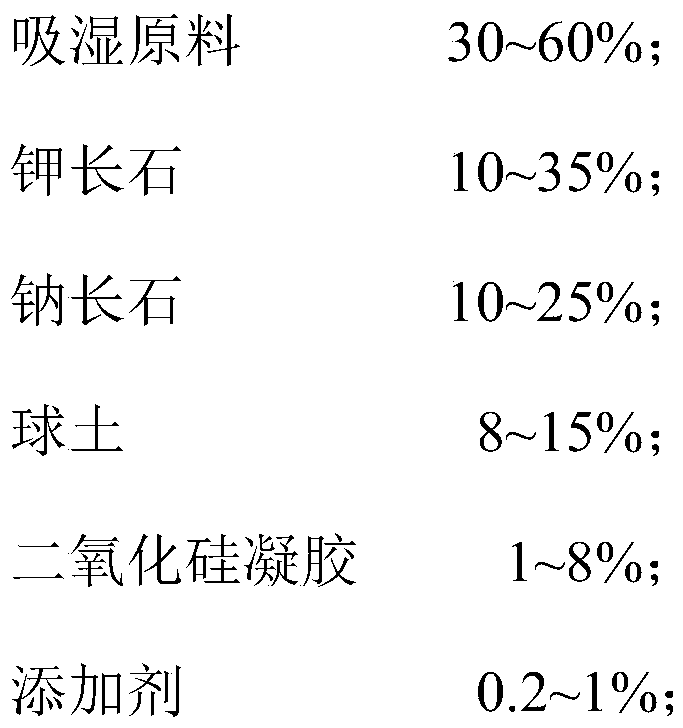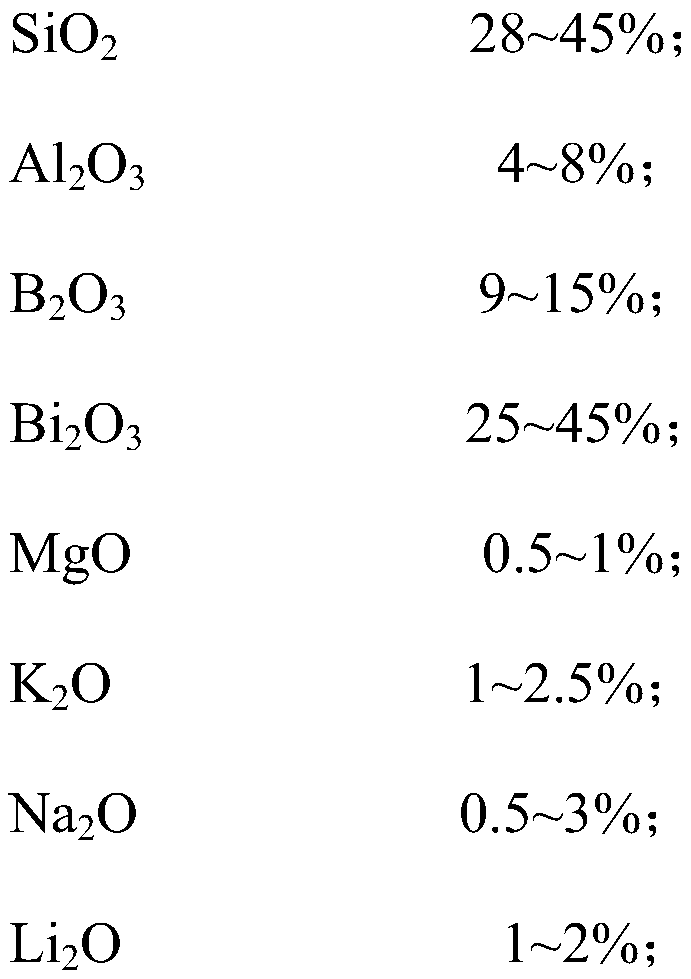A ceramic brick for purifying air and regulating humidity and its preparation method
A technology for purifying air and ceramic tiles, applied in the field of building ceramics, can solve the problems of poor adhesion between photocatalytic films and ceramic substrates, uneven distribution of photocatalysts, affecting the aesthetics of ceramics, etc. The effect of large-scale industrial production and high production efficiency
- Summary
- Abstract
- Description
- Claims
- Application Information
AI Technical Summary
Problems solved by technology
Method used
Image
Examples
Embodiment 1
[0031] A ceramic tile for purifying air and regulating humidity, which comprises a nanoporous body layer, a decorative pattern layer, a nanophotocatalytic material layer and a low-temperature thin glaze layer from bottom to top, and the low-temperature thin glaze layer has a porous structure or a crack structure.
[0032] Wherein the nanoporous body layer has the following components in terms of raw material weight percentage: 30% diatomite, 25% potassium feldspar, 25% albite, 11.8% ball clay, 8% carbon dioxide Silicone gel, 0.2% polyacrylic acid.
[0033] The nano-photocatalytic material layer is a nano-titanium dioxide layer.
[0034] The low-temperature thin glaze layer includes the following chemical composition by weight percentage: 28% SiO 2 , 8% Al 2 o 3 , 13.5% B 2 o 3 , 45% Bi 2 o 3 , 0.5% MgO, 2.5% K 2 O, 0.5% Na 2 O and 2% Li 2 O.
[0035] Preparation:
[0036] 1) Put each raw material component of the nanoporous green body in a ball mill together with w...
Embodiment 2
[0042] A ceramic tile for purifying air and regulating humidity, which comprises a nanoporous body layer, a decorative pattern layer, a nanophotocatalytic material layer and a low-temperature thin glaze layer from bottom to top, and the low-temperature thin glaze layer has a porous structure or a crack structure.
[0043] Wherein the nanoporous body layer has the following components in terms of raw material weight percentage: 60% zeolite, 10% potassium feldspar, 13% albite, 15% ball clay, 1% silica gel Glue, 1% sodium tripolyphosphate.
[0044]The nano-photocatalytic material layer is lanthanum-doped nano-titanium dioxide.
[0045] The low-temperature thin glaze layer includes the following chemical composition by weight percentage: 45% SiO 2 , 4% Al 2 o 3 , 15% B 2 o 3 , 31.5% Bi 2 o 3 , 0.5% MgO, 2.5% K 2 O, 0.5% Na 2 O and 1% Li 2 O.
[0046] Preparation:
[0047] 1) Put the raw material components of the nanoporous green body in a ball mill together with water...
Embodiment 3
[0053] A ceramic tile for purifying air and regulating humidity, which comprises a nanoporous body layer, a decorative pattern layer, a nanophotocatalytic material layer and a low-temperature thin glaze layer from bottom to top, and the low-temperature thin glaze layer has a porous structure or a crack structure.
[0054] Wherein the nanoporous body layer has the following components in terms of raw material weight percentage: 45% sepiolite, 35% potassium feldspar, 10% albite, 8% ball clay, 1% carbon dioxide Silicone gel, 1% carboxymethylcellulose.
[0055] The nano-photocatalytic material layer is neodymium-doped nano-titanium dioxide.
[0056] The low-temperature thin glaze layer includes the following chemical composition by weight percentage: 43.5% SiO 2 , 8% Al 2 o 3 , 15% B 2 o 3 , 25% Bi 2 o 3 , 1% MgO, 2.5% K 2 O, 3% Na 2 O and 2% Li 2 O.
[0057] Preparation:
[0058] 1) Put each raw material component of the nanoporous green body in a ball mill together w...
PUM
 Login to View More
Login to View More Abstract
Description
Claims
Application Information
 Login to View More
Login to View More - R&D
- Intellectual Property
- Life Sciences
- Materials
- Tech Scout
- Unparalleled Data Quality
- Higher Quality Content
- 60% Fewer Hallucinations
Browse by: Latest US Patents, China's latest patents, Technical Efficacy Thesaurus, Application Domain, Technology Topic, Popular Technical Reports.
© 2025 PatSnap. All rights reserved.Legal|Privacy policy|Modern Slavery Act Transparency Statement|Sitemap|About US| Contact US: help@patsnap.com



